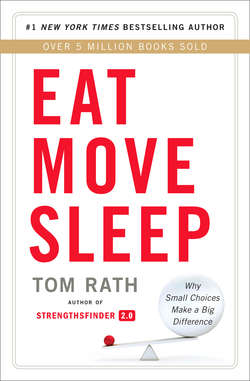Читать книгу Eat Move Sleep - Tom Rath - Страница 17
На сайте Литреса книга снята с продажи.
ОглавлениеWhy Timing Matters
8
Empty Stomach, Bad Choices
The hungrier you are, the harder it is to resist unhealthy foods. When your stomach is empty, your blood sugar levels drop. This increases your desire for foods like burgers, pizza, brownies, and ice cream. When researchers used functional MRI brain scans to study why this happens, they discovered that the body focuses on feeding itself high-calorie foods because it wants to get blood sugar levels back to normal.
An empty stomach also makes you more likely to start your meal with the wrong foods, even when you have a variety of choices. One experiment found that students who were asked to fast from dinner until lunch the next day were more than two times as likely to start their meal with a roll or french fries, compared with a control group that ate normally. In contrast, most of the people in the control group started by eating a vegetable.
To keep myself from going into starvation mode, I decided to keep a standby pack of mixed nuts in my work bag. This homemade snack pack now goes everywhere with me, just in case I am stuck with no healthy options nearby. Not only does this help satisfy cravings, it also serves as a backup when I attend meetings or events with limited food choices.
When you are away from home, take small bags of nuts, fruits, or vegetables with you in case you get hungry. Keep these healthy snacks nearby to satisfy a mid-afternoon craving. When you plan for healthier choices in advance, poor last-minute decisions are easy to avoid.
The 20-Minute Meal Rule
When you eat too fast, your digestive system does not have enough time to send a “you’re getting full” message to your brain. So you tend to keep eating — and end up eating too much. When you overeat, you get less enjoyment from consuming the excess quantities compared with the initial flavorful bites. So when you rush through a meal, you eat more than you need, and you enjoy the food less.
Eating fast not only leads to overconsumption, it also nearly doubles your risk of obesity and increases your odds of developing Type 2 diabetes by two and a half times. In contrast, if you eat slowly and take the time to savor each bite, you will consume significantly less and avoid these ill effects.
Rapid eating can also cause discomfort after a meal. When you eat too fast, you introduce extra air into your digestive tract. This overloads your stomach, causing it to produce more acid. The result is heartburn, or what is technically known as gastroesophageal reflux disease (GERD). One study found that eating a meal in 5 rather than 30 minutes made people 50 percent more likely to have heartburn.
If you chew your food properly, a meal should take at least 20 minutes, according to one expert. Slowing down can also give your brain and stomach time to realize you are getting full. Even when takeout food is the only option, there are things you can do to slow your consumption.
Something as simple as forcing yourself to put your food, arm, fork, or spoon down between bites can help you avoid rapidly shoveling food into your mouth. Savor the first few bites of each meal. Learn to enjoy the process of eating foods that are good for you.
Move Early for a 12-Hour Mood Boost
When a team of researchers asked a group of college students to exercise, then tracked their mood the next day, they made a surprising discovery. After just 20 minutes of a moderate-intensity workout, the students were in a much better mood compared with a control group of students who did not exercise. The researchers expected this result based on previous findings. What surprised them was the durability of this increase in mood. Students in the group who exercised continued to feel better throughout the day. They were in a better mood 2, 4, 8, and even 12 hours later.
A mere 20 minutes of moderate activity could significantly improve your mood for the next 12 hours. So, while working out in the evening is better than no activity at all, you essentially sleep through and miss most of the boost in your mood. Exercising before you eat breakfast, instead of after, could also burn additional fat and improve glucose tolerance. Working out early also alleviates any guilt of putting it off and provides extra energy for the remainder of the day.
Instead of treating morning exercise as something that will drain your energy, as it often does the first few days until you establish a routine, remember that it will eventually give you additional energy. In addition to looking and feeling better, research suggests you will have extra brainpower and creative thought following periods of vigorous activity. Working out in the morning will also keep the 12-hour mood boost from going to waste.
Select a healthy standby snack today. Carry it with you wherever you go.
Make every meal last at least 20 minutes.
Exercise in the morning for a better mood and more brainpower all day.
